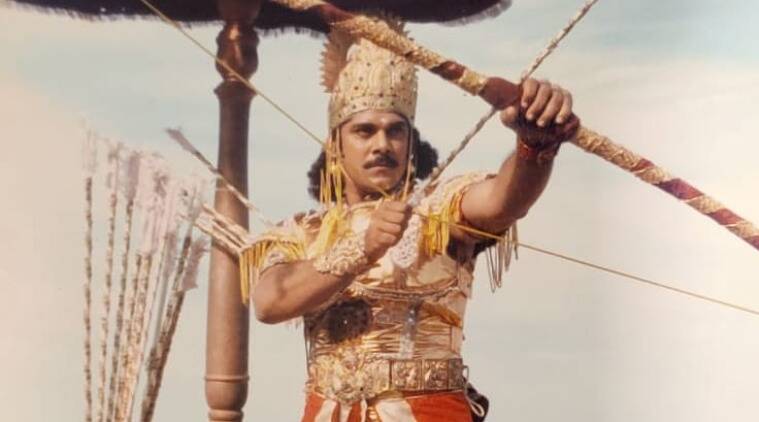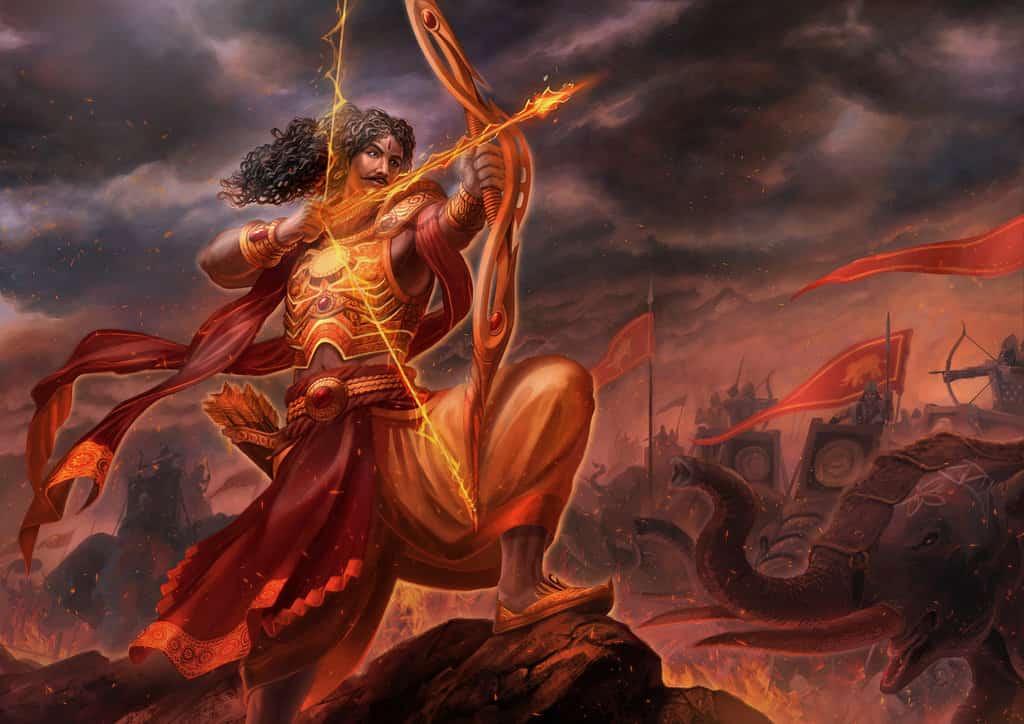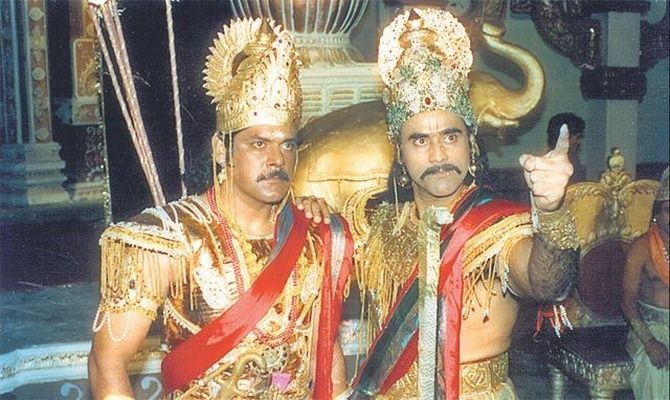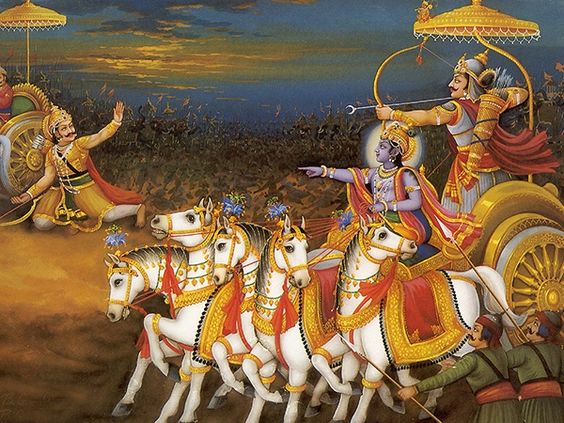
Karna in Mahabharata : A Character Sketch

Our lives are filled with interesting characters. They have virtues. They have vices. They can sometimes be inspirational, while at the same time ironical.
Beyond viewing them through the narrow lenses of heroes and villains, good or evil, characters in themselves are unique and come in different shades.
Unlike our popular imagination characters don’t perfectly fit in the “good” or “bad” category. Sometimes they can be idealistic, while at different scenarios, they can turn selfish and pragmatic.
Each character is a rainbow in themselves. There is the great, the good, the bad and the ugly all within the same heart and mind.
Mahabharata, is one such epic that is full of interesting characters. If we look religion beyond way of life and identity and more towards wellbeing and wisdom, even characters can turn lively and fascinating!
Apart from being the fountainhead of Bhagwat Geeta, Mahabharata is an epic that celebrates roles. The role of a King, the role of a teacher, the role of a friend, the role of a son, the role of an advisor, and much more.
As a kid, I enjoyed B.R. Chopra’s Mahabharata series. Fortunately, I got to revisit them again, and this is when I thought of doing some character sketches.
As a disclaimer, these character sketches are done out of my own personal passion viewed through my lenses. I, do not hereby claim any sort of legitimacy from scriptural point of view. The character sketch is largely based on as portrayed in the series.
The most interesting character of Mahabharata to me has been Suryaputra, Dhanveer: Karna.
Karna: A Devoted Friend, A Benevolent Fighter, and Virtuous Opponent
1. Stays Generous in the face of Ingenerosity and Injustice

If there is something Karna witnesses throughout his life: it is injustice. Right from birth he is a victim of injustice. His biological mother Kunti abandons him after he is born. When he is a teenager and is passionate about learning archery, Guru Dhronacharya rejects him saying that only Khstteriyas and Princes were allowed to enroll in the Guru Kul.
Karna is not even permitted to compete and showcase his skills in the “Rangabhomi”, where once again he faces ingenerosity based on his social status and identity.
In the series, Karna faces Ingenerosity once again even when it comes to marriage. Unlike a Bollywood movie, he does not win a princess after saving her life! Princess Asavari rejects and hesitates to marry him when she comes to know about his identity.
Even his death is a form is an injustice in some way. Could be due to curse or a divine plan, he is shot with an arrow, when unarmed trying to get out the wheel of his stuck chariot.
One of the greatest warriors meets his end, not in a valiant war, but stuck and in deliberation.
Despite facing numerous injustices and ingenerosity, Karna choose generosity over bitterness. He chooses to become a Dhanveer, who is remembered for his generosity over ages.
Although he is seen lamenting and expressing displeasure, he does not allow the bitterness to engulf his friendship, morality and generosity.
When asked for his armor and earrings, he does not hesitate to donate them despite knowing that the Brahman was Indra in disguise.
When his biological mother requests him not to kill her five sons, Karna promises that all her 5 sons will live.
Thus amidst numerous injustices and ingenerosity, Karna choses generosity over bitterness earning him the title of “Dhanveer”. Faced with ingenerosity over his identity, he leaves bind a legacy and identity based on generosity!
2. Finds Solutions Instead of Giving Up

When rejected by Dhronacharya, Karna looks up to Parshuram to learn.
When rejected in the “Rangabhomi”, he chooses to showcase his skills in the “Radabhomi.”
When rejected by the princess Asavari, he chooses to challenge the social norm by marrying her maid Padmawatti.
Despite being aware that his guru Parshuram and a Brahman had cursed him, and Lord Krishna was Arjun’s charioteer, Karan chooses not to give up.
Even when Karan forgets his learnings in the battlefield and is encountered with death, he still tries to buy time by trying to take out the stuck wheel of his chariot.
If we look from a different perspective and discount the fact that Karna in real was the son of Kunti and a Prince, it’s a transformation to witness his rise from a socially and politically marginalized class to being the King of Ang and eventually, one day, the Commander-In-Chief of the Kaurava army.
He earns praise from Duryodhana, admiration from ShreeKrishna and earns valor, honor and immortality for his skills and generosity.
In a way it is remarkable, that although a victim of injustice, he ascends from being a son of charioteer to the King of Ang and finally the Commander-In-Chief of the Kaurava army through his own actions.
3. Devotes life for Friendship

When Shree Krishna reminds Karna that he is on the wrong side or on the side of the “Adharma” or “Injustice”, Karna replies Shree Krishna that he is already indebted to Duryodhana for this life.
He states that the relationship between him and Duryodhana is not based on “Dharma” or righteousness but love, affection and friendship.
Karna’s devotion towards friendship is unconditional and unparalleled. While someone might challenge whether or not it was in his capacity to intervene and prevent Duryodhana’s injustices, when it comes to loyalty and devotion, Karna’s friendship is unparalleled.
Even after knowing the fact that he is also a Kuntiputra, his unwavering commitment towards Duryodhana remains unquestionable. Karna’s and Duryodhana’s friendship is perhaps one the most beautiful relationships in the Mahabharata.
4. Challenges the Idea of Identity

Son of a Charioteer? Radhe? Karna? Kuntiye? Suryaputra?
Every time be it at the “Rangabhomi”, “Rajdarbaar”, or the “Syawanbara”, or the “Guru Kul” Karna is constantly questioned about his identity.
However, instead of concealing or feeling inferior about his identity Karna embraces his identity as it.
Even in that era, Karna seems to be bold enough to question whether identity is all about family, parents and social status, and whether such an identity can be a barrier to achieve anything.
He embraces his identity as a “Sudputra” or son of a charioteer.
He embraces his identity as “Radhe” based on his foster mother.
He creates an identity as “Angraaj” or the King of Aang.
He creates his identity as the devotes friend of Duryodhana.
He creates his identity as the “Dhanveer.”
He embraces his on-birth identity without hesitate while creating his own identity through deeds and actions.
5. An Active Participant in Perpetuating Injustice
Karna despite being an iconic warrior, a devoted friend, and morally upright individual was not immune from being an active participant of injustices committed against Draupadi and Abhimanyu.
Perhaps as the series depicts, Karna’s greatest folly which he could avoid was calling Draupadi a prostitute.
Karna possessed the human emotions of anger, rivalry and egoism, however he never allows them hijack his consciousness. Unlike Duryodhana, he has great reverence from Shree Krishna and shows respect towards elders like Bhisma.
Often referred to the right man in the wrong party, Karna is a devoted friend, who stays generous in the face of ingenerosity to leave bind a legacy as virtuous opponent, and a valiant warrior who dares the challenge the norms of the era.
Appreciate the creator